Subscribe to wiki
Share wiki
Bookmark
Openmesh
The Agent Tokenization Platform (ATP):Build autonomous agents with the Agent Development Kit (ADK)
0%
Openmesh
Openmesh is an open-source project aimed at transforming data and infrastructure management. It focuses on creating a decentralized system for securely storing important global data, starting with Web3 data. [1][2]
Overview
Founded in December 2020 by Ashton Hettiarachi, Openmesh is an open-source project that aims to develop a decentralized data infrastructure for securely storing global data, beginning with Web3. The Openmesh Network is designed to collect, encrypt, store, process, and stream data, offering universal connectivity without requiring registration, licensing, or payments.
Initially focusing on Web3 data, including cryptocurrency and blockchain applications, Openmesh plans to extend its coverage to public health and scientific research data by 2024. Its Unified APIs are intended to enable unrestricted data access, while developer tools like Xnode are designed to facilitate the quick creation of decentralized data clouds. The Pythia application is meant to support data scientists in managing crypto and Web3 data products.
Adhering to principles of decentralization, transparency, and community governance, Openmesh aspires to create a world where data is open, decentralized, and accessible to all, ensuring the free flow of information for future generations.[3][4]
Products
Xnode
Xnode is part of the Openmesh Network, an open-source project that aims to decentralize data and IT infrastructure. Openmesh brings together a team with experience from Web3 projects like Fantom, Ripple, Ethereum, Cosmos, AWS, and Aragon to address the issue of data management being dominated by major corporations.
Integrating features from AWS, IPFS, Chainlink, BitTorrent, and Oracle Cloud, Openmesh provides immutable data and decentralized cloud services through OpenAPIs and Xnode. Xnode manages computational power and storage across various environments, enhancing network efficiency and integrity by functioning as data collectors, aggregators, and validators.
Xnode Studio is designed to enable users to quickly design, develop, and manage Web2 and Web3 infrastructure. It includes a resource aggregation engine that identifies optimal compute, storage, and GPU resources from various providers.
Xnode and Openmesh aim to advance the Web3 industry by developing the next generation of open data and infrastructure.[5][6][7][8]
Use Cases
Xnode within the Openmesh Network aims to address various practical needs across different sectors:
-
dApp Development Platform: Startups utilize Xnode to rapidly prototype, test, and deploy decentralized applications, leveraging extensive Web3 data resources.
-
Real-time Price Optimization: DEX aggregators use Xnode to fetch real-time prices from decentralized exchanges, aiming to provide competitive rates for token swaps.
-
Financial Analysis Engine: Hedge funds deploy Xnodes for real-time analysis of cryptocurrency markets and DeFi transactions, aiming to enhance investment decision-making.
-
Web3 Data Analytics: Data science firms employ Xnode for specialized analytics, aiming to predict DeFi trends and analyze behaviors within blockchain games.
-
Decentralized Compliance System: Regulatory bodies and law firms utilize Xnodes to monitor blockchain transactions and smart contract events, aiming to ensure regulatory adherence and support legal investigations.
-
Asset Valuation Dashboard: Game developers leverage Xnode to create live dashboards displaying in-game asset values, aiming to enhance player engagement and facilitate informed trading decisions.
-
Player Behavior Analysis: GameFi platforms utilize Xnode to analyze historical player behaviors, aiming to refine gameplay mechanics and optimize token economics.
-
Decentralized Research Platform: Universities and research institutions establish Xnodes to foster collaborative research data clouds, aiming to accelerate scientific progress.
-
Global Health Monitoring: Health organizations employ Xnode to develop decentralized health monitoring systems, aiming to enable timely access to critical health data for effective responses to global health crises.[5][6][8]
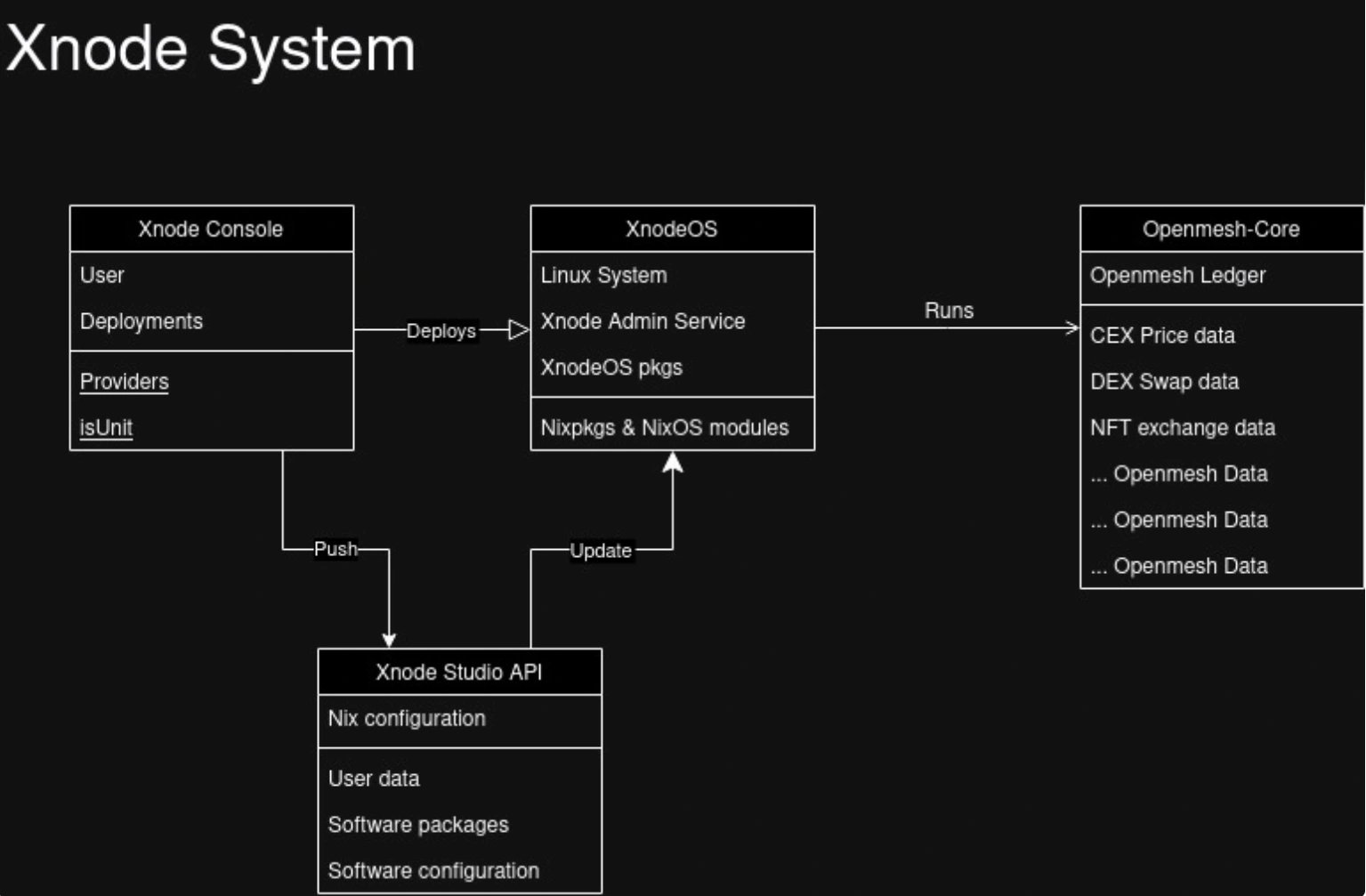
Openmesh API
The Openmesh API, currently in development, collaborates with Openmesh Core to retrieve data from the network's IPFS layer through Openmesh Gateway. It provides essential functionalities: a RESTful API for historical data retrieval, a Websocket for real-time data streaming, and legacy Unified APIs inherited from the Pythia prototype.
Users utilize Pythia, an open-source analytics tool based on Apache Superset, suitable for specific use cases without requiring extensive data transfers. For managing large historical datasets, scalable object storage via Cloudflare CDN is available. The Websockets API ensures real-time streaming of market events with minimal latency.
Unified APIs facilitate global access to crypto and Web3 data without fees or mandatory registration. They encompass WebSocket for live market data, REST APIs for historical data, and GraphQL for customized queries across crypto exchanges, public blockchains, DeFi, Metaverses, and GameFi activities.[6][9]
Use Cases
The Openmesh API supports various applications:
WebSocket - Live markets & blockchain data (Streaming service)
- Real-Time Crypto Trading Platform: Real-time platform showcasing crypto prices, order books, and transactions with instant data access.
- Live DEX Price Tracker: Displays live price disparities across decentralized exchanges, aiding optimal token swapping rates.
- Real-time GameFi Dashboard: Provides live in-game asset prices, transactions, and activities for strategic decision-making.
- Live Metaverse Activity Monitor: Showcases real-time metaverse activities, transactions, and asset movements to enhance user engagement.
- Hystorical Crypto Analysis Tool: Provides analytics on historical crypto data, including price trends, without additional fees.
- DeFi Historical Performance Tracker: Analyzes historical performance metrics of DeFi projects to refine growth strategies cost-effectively.
- Blockchain Game Performance Analytics: Analyzes historical game performance metrics and user engagement to enhance game mechanics.
- Metaverse Land Value Analysis: Offers insights into historical value trends of metaverse land parcels to inform investment decisions.
- Historical Blockchain Audit Tool: Provides a platform for auditing historical blockchain data comprehensively and without extra fees.
- Customized DeFi Analytics Dashboard: Supports efficient and personalized DeFi analysis through customizable data feeds.
- GameFi Asset Monitoring Tool: Monitors specific game assets and real-time values, facilitating optimized gameplay strategies.[6][9]
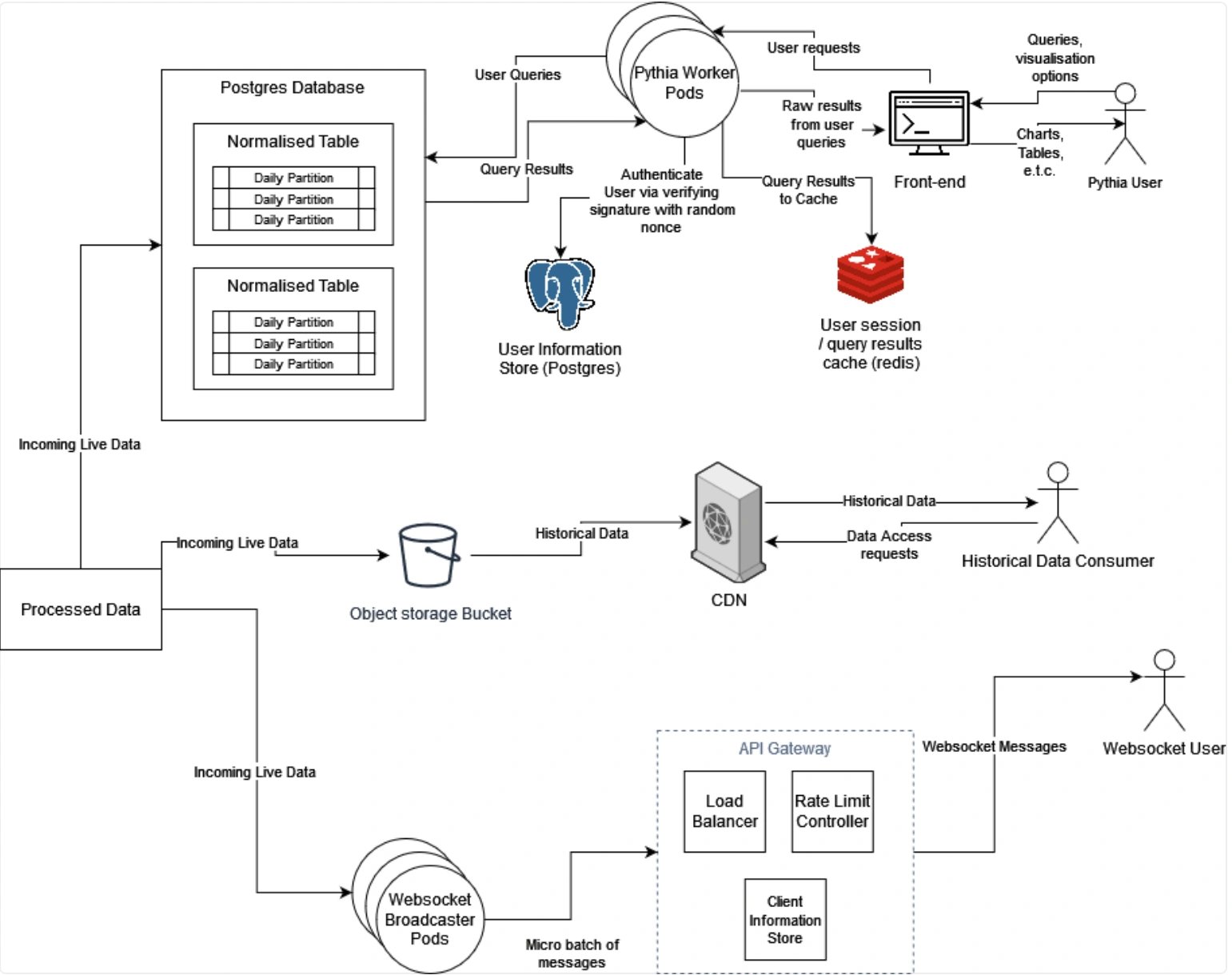
Pythia
Pythia, currently in active development at Openmesh, functions as a dynamic analytics and query engine utilizing a PostgreSQL database for storing extensive market data. It enables direct querying through an interface powered by Apache Superset, an open-source business intelligence tool.
Pythia's primary role is to transform vast raw data into actionable insights, facilitating the creation, visualization, and deployment of tailored Web3 data products. Users can design and merge queries to build customized dashboards, which can be stored privately or shared publicly via web3 wallets, promoting collaboration and innovation. Whether users are seasoned developers or newcomers, Pythia empowers them to realize their data-driven visions effectively.[6][10]
Use Cases
Pythia serves various practical applications within the Openmesh ecosystem, enabling users to create customized data dashboards and analytics solutions:
- Crypto Market Trends Dashboard: Traders monitor real-time cryptocurrency prices, volume spikes, and liquidity pools for informed investment decisions.
- Global DeFi Interest Rate Monitor: Investors track and compare interest rates across various DeFi platforms to optimize yield strategies.
- Celebrity NFT Tracker: Artists and managers visualize trending celebrity NFTs to strategize releases based on market demand.
- DeFi Performance Analysis: Enthusiasts analyze metrics like total value locked, liquidity provider returns, and smart contract activities across DeFi platforms.
- Blockchain Game Metrics: Developers monitor user engagement, in-game asset trading patterns, and player achievements to enhance gameplay.
- Metaverse Real Estate Insights: Investors monitor trading trends and popularity of virtual real estate parcels across different metaverses for investment opportunities.
- Public Blockchain Health Monitor: Network analysts monitor public blockchain metrics such as block sizes, transaction speeds, and wallet activities to ensure optimal network performance.[6]
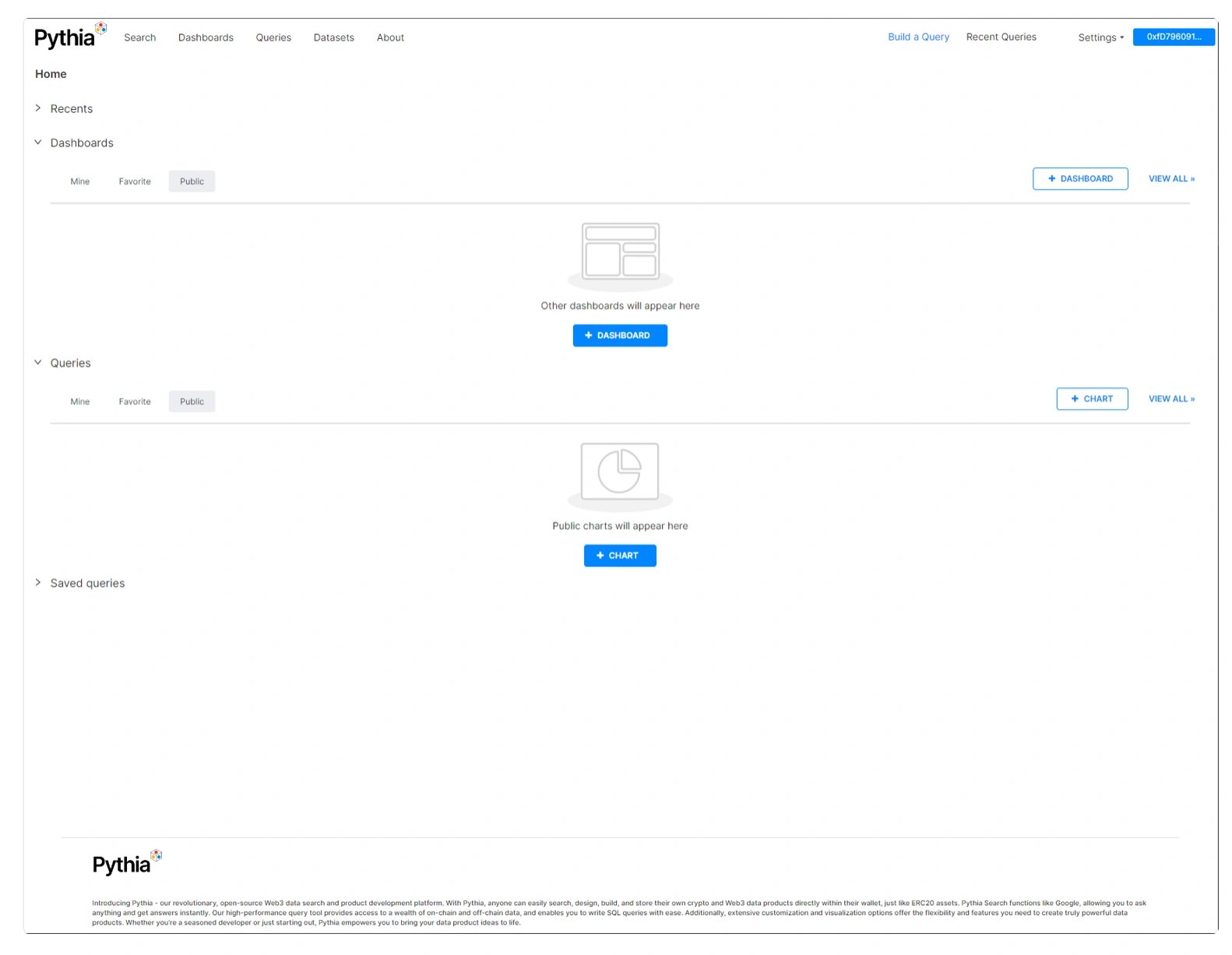
Infrastructure
XnodeOS
XnodeOS, developed from NixOS, focuses on serving web3 nodes and data infrastructure across diverse cloud platforms through iPXE netboot, ISO, and kexec deployment methods. It prioritizes minimal dependencies and robust deployment practices.
As of June 2024, it is in its initial phases, XnodeOS utilizes the Studio API to deliver JSON responses to Xnodes. Future developments aim to implement a git-based configuration system via Xnode Studio, which is intended to introduce functionalities like version control, rollbacks, and CI/CD capabilities.
To enhance scalability, XnodeOS is exploring integration with PowerDNS for efficient notification of configuration updates using TXT records. It also advocates for self-hosted git infrastructure to promote reliability and decentralization in its configuration management approach.[11]
Openmesh Core
Openmesh Core employs the Tendermint consensus protocol, specifically implementing CometBFT in Go, aiming to ensure the secure and reliable operation of the blockchain. It facilitates the selection of proposers and validation of transactions, along with finalizing block commitments through pre-votes and pre-commits.
Network communication is overseen to synchronize nodes and resolve discrepancies, while employing Byzantine Fault Tolerance mechanisms to guard against malicious nodes by enforcing stake slashing.
Immediate finality upon block commitment enhances transaction integrity. The core also aims to support protocol upgrades, manage feature implementations, and maintain data integrity and availability via IPFS.[12][13]
Dataflow
Openmesh manages its data flow through a streamlined process designed for efficiency and scalability. Initially, centralized exchange (CEX) data in semi-structured JSON format is collected into a raw topic partitioned by exchange-symbol pairs, while structured blockchain data, formatted in Apache Avro, is directed to specific topics. A network of stream processors then ingests this data, ensuring parallel processing with ordered event handling based on exchange and symbol criteria.
Processed data, standardized using Avro schemas, undergoes archival into object storage after conversion to Apache Parquet format, optimizing storage efficiency. Additionally, data is stored in a PostgreSQL database for query-based analytics using PowerQuery, supporting up to 1000 rows per event topic table. Finally, market events are streamed to users via WebSocket broadcasters, facilitating scalable message delivery and dynamic group rebalancing to meet operational demands.[14]
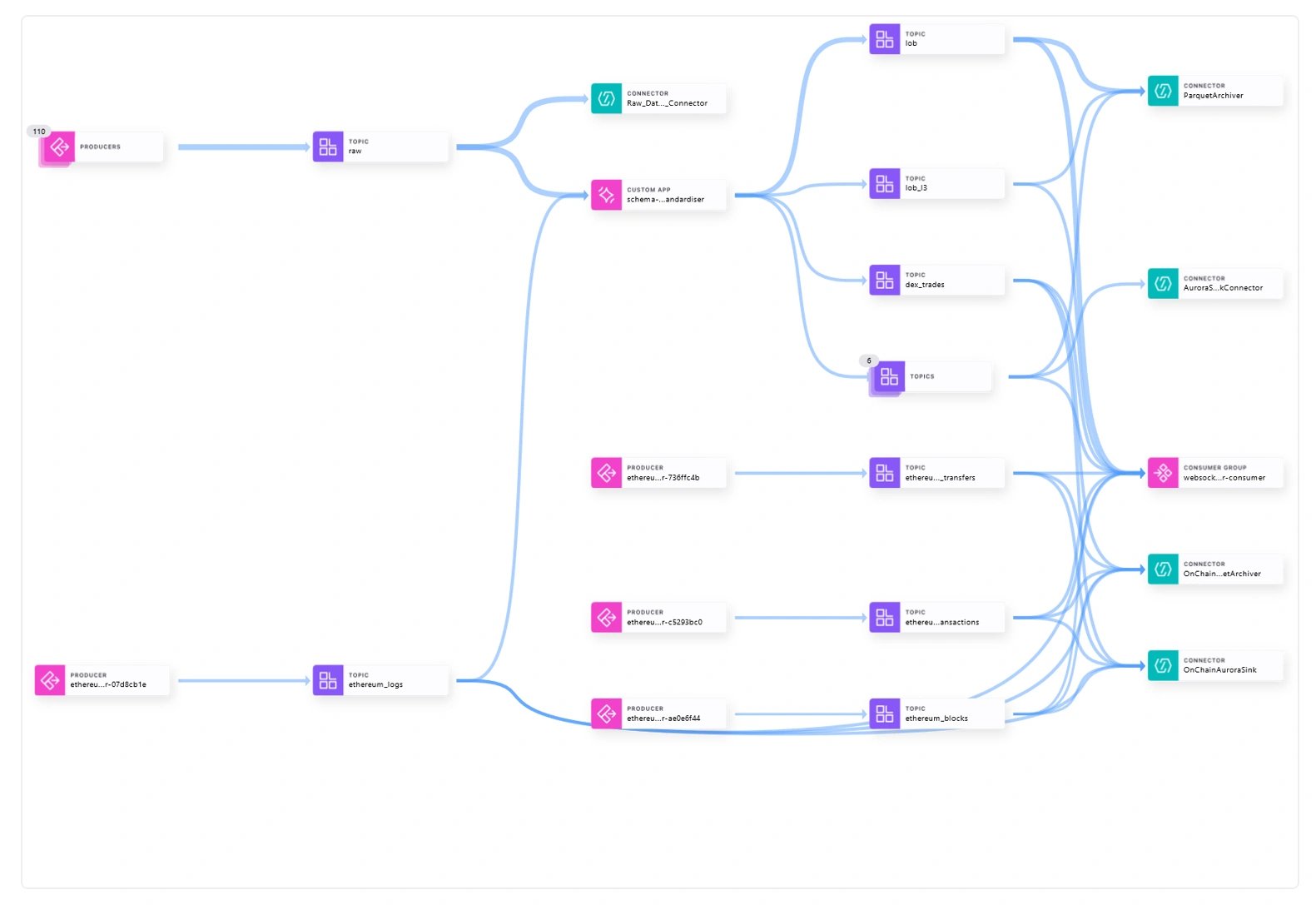
Connectors
Data connectors are pivotal components of the Openmesh ecosystem, designed to efficiently gather real-time data from diverse on-chain and off-chain sources. Each connector operates independently within a Kubernetes environment, ensuring robustness and scalability. They handle various error scenarios, such as rate limits and connection failures, to maintain continuous data flow.
Blockchain connectors utilize JSON RPC and websockets to interface directly with nodes, facilitating real-time updates on new blocks and detailed transaction information. Openmesh is built to support any node configuration, enabling users to deploy connectors with flexibility. The modular architecture fosters community-driven expansion to integrate additional crypto data sources, with future plans for enhanced connector management and monitoring capabilities.[15]
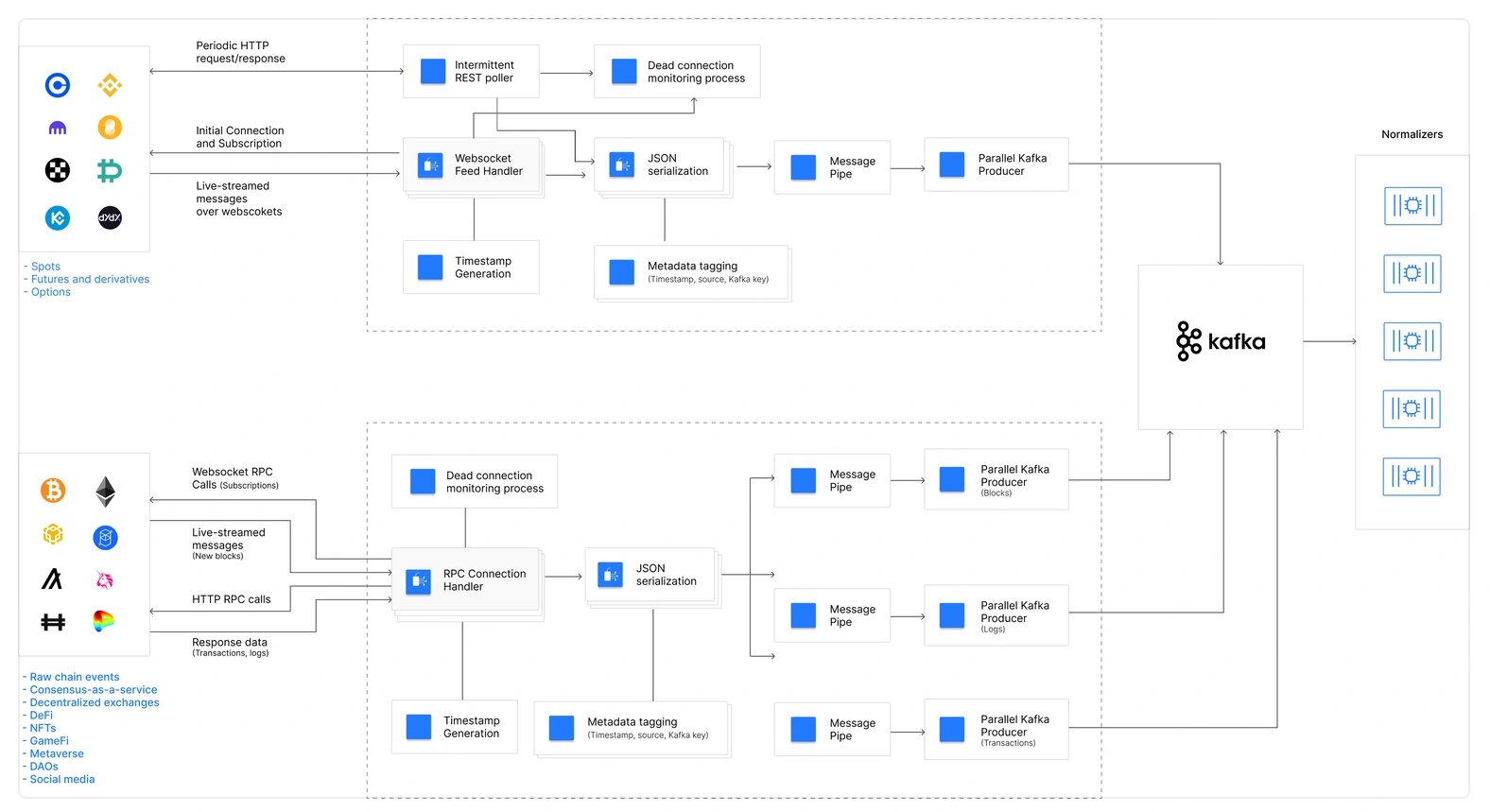
Governance
Openmesh emphasizes governance and transparency to build trust and encourage innovation. Governed by a diverse Board of Directors and advisory committees, the organization ensures accountability and ethical conduct.
Transparency is central, with Openmesh openly sharing decision-making processes, financial reports, and updates through various channels like blogs and community calls. This openness strengthens stakeholder trust and engagement.
Ethical standards are strictly maintained through a comprehensive Code of Conduct and adherence to laws. The organization also safeguards whistleblowers who report unethical behavior.
Community involvement is pivotal, with Openmesh actively seeking feedback through forums, surveys, and events to empower community contributions to decision-making.[17]
Ambassador Program
The Openmesh Ambassador Program aims to empower individuals to advocate for Openmesh within their communities, focusing on sharing knowledge about its technologies and engaging with enthusiasts to encourage growth.
Ambassadors have the opportunity to expand their professional networks, deepen their understanding of decentralized technology, and earn recognition for their contributions. They are also granted early access to new features, ensuring they stay informed about advancements and contribute effectively to community initiatives.[16]
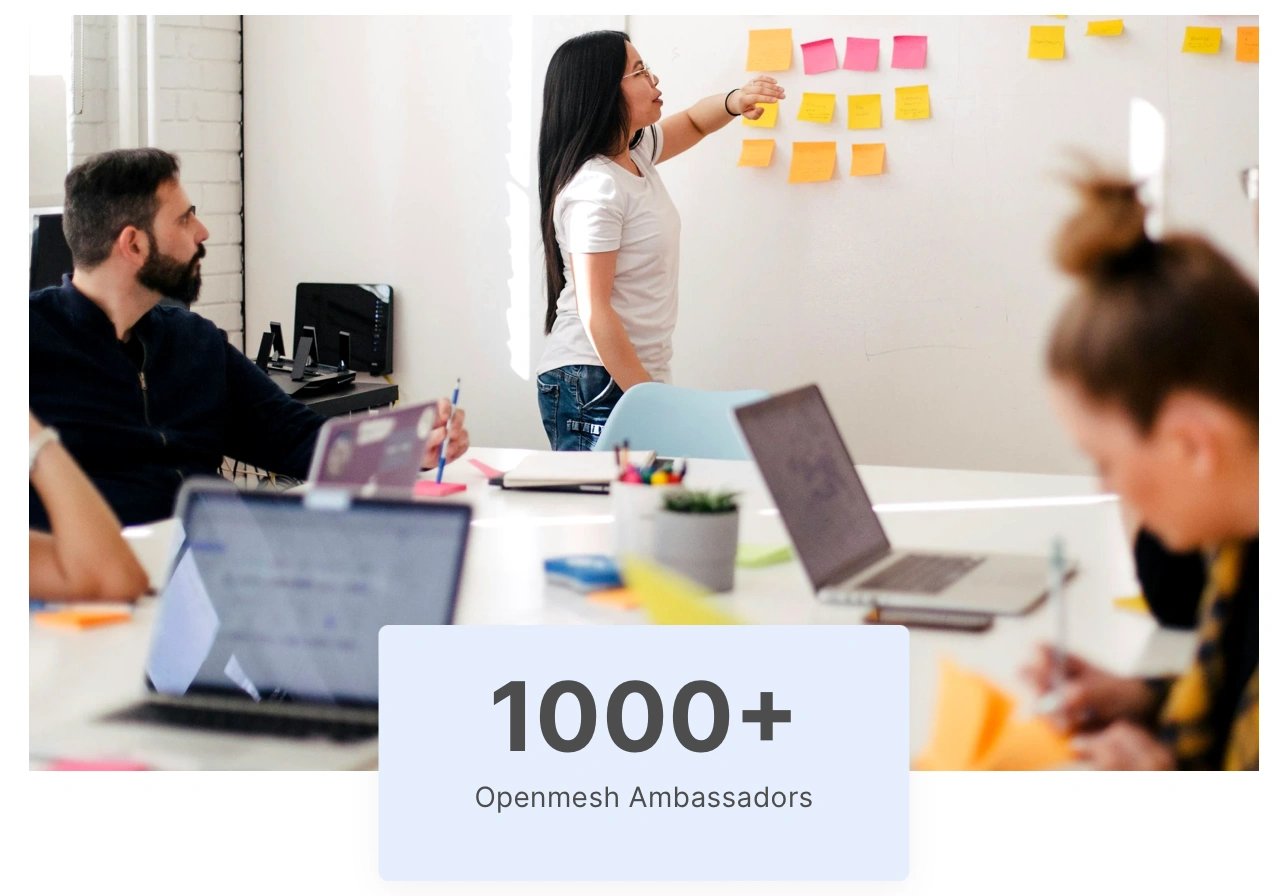
See something wrong?
The Agent Tokenization Platform (ATP):Build autonomous agents with the Agent Development Kit (ADK)
